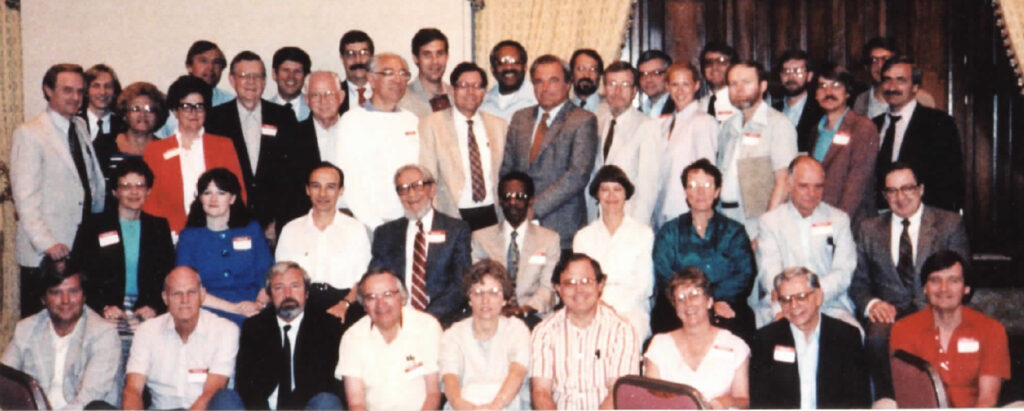The Society for Pastoral Theology (SPT) is a community of scholars, teachers, students, and practitioners of care committed to enriching the discipline of pastoral theology and advancing its role in equipping people for ministry. Membership is open to others sharing these concerns. We meet annually to engage presentations and workshops by various members of the Society and to work collaboratively in study groups. In addition, SPT publishes the Journal of Pastoral Theology which seeks to further the understanding of pastoral theology as a theological discipline and to provide resources for teaching and pastoral practice.
Mission Statement, Identity, and Purpose
The Society for Pastoral Theology (SPT) began in 1985 to create a forum for conversation among theological educators and others interested in critical reflection on the theology, theory and practice of care in ministry. We are a community of scholars, teachers, students, and practitioners of care committed to enriching the discipline of pastoral theology and advancing its role in equipping people for ministry.
Membership is open to others sharing these concerns. We understand pastoral theology as a constructive practical theological enterprise focused on the religious care of persons, families and communities. As such, it draws on interdisciplinary methods growing out of classical and contemporary theological traditions. Our intention is to inform and learn from theological conversation throughout the academy and to enhance the practice of ministry in congregational and specialized settings. Our membership is composed of pastoral theologians and practitioners who broadly identify themselves with Christian religious traditions. We seek to honor, understand and critically develop our own traditions of care. We also engage in ecumenical and interfaith dialogue.
Finally, we strive to be open to multiple practices of care from a variety of religious and secular traditions. We meet annually to engage presentations and workshops by various members of the Society and to work collaboratively in study groups. In addition, we also publish The Journal of Pastoral Theology in which substantive articles relating to these concerns appear.
Our Core Commitments
1. We are a community dedicated to collaborative reflection that revises, refines and extends the conceptual base and methodological resources of pastoral theology.
In our meetings and study groups we pursue a critical engagement of behavioral and social sciences with theological and biblical resources. We are committed to intellectual rigor within a praxis orientation. Our gatherings regularly include attention to works in progress which invite shared, critical conversation to extend and enrich emerging ideas.
2. In our life and work together we model a mutually respectful, inclusive community in which we strive to engage conversations that overcome historic barriers such as race, class, gender, sexual orientation, and able bodiedness.
We give particular attention to those among us who represent groups often marginalized in the academy and culture. We also deliberately seek to bring to our field the conceptual gains that listening to this diversity of experience among us affords. We actively seek diverse representation on the Steering Committee of the Society and rotate meeting sites to facilitate attendance of persons from various ethnic populations in our country.
3. We have committed ourselves to regular reflections on our programs and procedures. Careful attention is given to evaluation of each annual meeting to improve subsequent meetings, to increase the participation of members in the program and to ensure fidelity to our commitments.
We value and employ methodological and theological diversity in the enterprise of pastoral theology. This includes a common concern for developing and implementing liberative and transformative strategies of care in ecclesial and social structures, public policy, and interpersonal relationships. We seek to increase our skill and range of resources as teachers, supervisors and practitioners of care. Our meetings and workshops regularly include attention to educational and professional issues. We share resources and ideas to advance our effectiveness in academic and other specialized settings.
Founding Members

William V. Arnold, Harold Ellens, John H. Patton, *Glenn H. Asquith, Richard Evans, Stuart Plummer, Beverly Ball, Gene Fowler, James N. Poling, Brian C. Barlow, *Charles V. Gerkin, Thomas J. Pugh, James Beck, Maxine Glaz, Nancy Ramsay, Allan Bettis, John Gowins, Douglas Slaughter, C. W. Brister, Larry Graham, Samuel Southard, Sandra R. Brown, Rodney Hunter, John Spangler, *Donald S. Browning, *Homer L. Jernigan, Charles Stewart, J. Russell Burck, *Emma Justes, Charles Taylor, *Donald E. Capps, Jasper Keith, Ralph Underwood, John Carr, James N. Lapsley, A. J. van den Blink, Brian Childs, Elizabeth Liebert, David Waanders, Suzanne Coyle, *Liston Mills, *Peggy Ann Way, *James Dittes, *Paul Nicely, Gary S. Eller, Anita Ostrom
*DECEASED